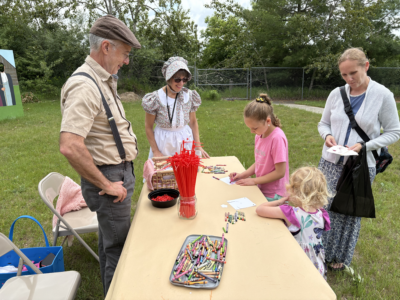Kuehnlein to lead ALL program on ‘How to Raise a Citizen’

Courtesy Photo Tim Kuehnlein, Alpena Community College Political Science and History instructor, will review and discuss Lindsey Cormack’s book, “How to Raise a Citizen (And Why It’s Up to You to Do It),” from 6 to 8 p.m. on Thursday at Center Building Room 114 at ACC.
ALPENA — The Association of Lifelong Learners at Alpena Community College presents the program, “How to Raise a Citizen” on Thursday, led by ACC Political Science and History Instructor Tim Kuehnlein.
This event is free and open to the public.
The program will feature Kuehnlein’s review and discussion of the Lindsey Cormack book, “How to Raise a Citizen (And Why It’s Up to You to Do It),” from 6 to 8 p.m. in Room 114 of the Center Building at ACC.
Cormack’s 2024 book “speaks directly to an America in which civic knowledge is alarmingly sparse and many people dread politics,” a summary from ALL states. “It’s a tool for parents, educators, and anyone eager to fill this gap.”
Kuehnlein, a longtime ALL presenter, brings his interest in global politics, community engagement, the arts, and civics engagement, as he shares insights in an effort to foster civil discourse on subjects that impact our lives.
“I thought this was so powerful,” Kuehnlein said of the book. “It’s just a very simple message to parents about how important it is to foster civics awareness and help your kids understand how government works, and how important it is to understand politics, even though nobody wants to really talk about it in this day and age.”
Cormack holds a doctorate and is an Associate Professor of Political Science at Stevens Institute of Technology. She is a contributor to the New York Times, Washington Post, CBS News, Fox News, Bloomberg, FiveThirtyEight, and other media outlets. She authored the 2018 book, “Congress and U.S. Veterans: From the GI Bill to the VA Crisis,” and runs DCinbox, a free and open real-time archive of every official e-newsletter sent by sitting members of Congress to their constituents.
“She just really elevates the importance of civics education,” Kuehnlein said. “We’re doing ourselves a major disservice. We don’t emphasize it in school. She goes through a bunch of statistics on how, in our federal system, every state handles civics education totally different, and furthermore, we don’t treat it like we do a lot of other subjects.”
He said parents need to step in and help fill in the gap with children of all ages, using concepts they can relate to and understand.
Kuehnlein said the focus is not to bring up controversial topics, but to encourage and teach children about being engaged in their community.
“It’s more about civic engagement,” Kuehnlein said. “She really emphasizes conversation — how important it is to develop the skill of being able to converse, because that’s the beginning of any relationship … It’s also the beginning of keeping a society together.”
He said Cormack’s book explains that we need to teach our children how to talk about difficult things, but also talk to them about the importance of making a difference.
“How to Raise a Citizen” doesn’t focus on partisan politics, but rather explains how and why we should learn to have civil discussions with those we may not agree with on the surface.
“She says, when you engage in this conversation, if you’re trying to convince people to think the way you think, you’re missing the point,” Kuehnlein said. “It’s about understanding how we come to our own opinions … and how we get along with others. It’s about trying to understand ourselves, and why we believe what we believe, why we do what we do, but also, by engaging with others in conversation, we try to understand why they believe what they believe, and why they do what they do.”
He said through that process, you can discover new things about yourself and others.
“That conversation, that dialogue, that introspection, is what makes relationships successful,” Kuehnlein said.
Focusing on listening to and learning from one another will help us be better, individually and as a whole, he said.
“It gets to the core of saying, ‘Politics is life,’ and we can’t reject it, we can’t bury our heads and say ‘I don’t want to talk about it.’ It’s going to affect us. Politics is life. Life is political, from very early on,” Kuehnlein said. “All politics is is a struggle over values, and whose values are going to dominate in our families, in our relationships, in our society.”
He said it is up to us to help our children learn how to communicate and converse about subjects that will affect them now and in the future.
“The sooner we help our children understand how to engage with others, without being overtly political, we’re enhancing our ability for our children to succeed in life, personally, and in the larger social political realm,” Kuehnlein said. “We shouldn’t be afraid of politics, and we shouldn’t be negative about politics, because it is a reality that we have to understand if we want to move forward.”
He explained that if we isolate ourselves from those with different political beliefs, division will become more severe, and relationships and collaborations will be more difficult in the future.
“The danger of not embracing the political arena in a more conversational approach, as opposed to a confrontational approach, is that we create a society of almost fatalism,” Kuehnlein said. “Where we just divide, we don’t want to talk about it, we feel defeated, we give up. We don’t realize the larger possibilities.”
Civic Learning Week starts Monday across the nation, and runs through Friday. Educational events are scheduled across the U.S., including a Civic Learning Week National Forum on Thursday.
Reach Darby Hinkley at dhinkley@thealpenanews.com, or 989-358-5691.



